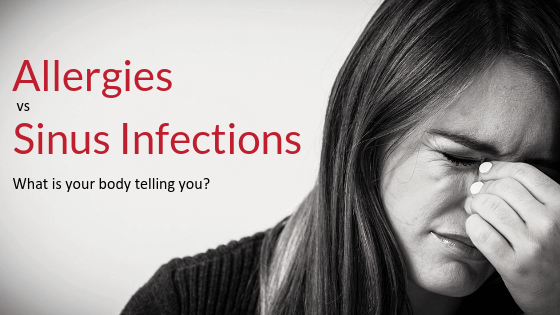While many of us enjoy the beautiful blooms and tranquil weather of springtime in Alabama, the changing of the seasons also brings pollen and other allergens into the atmosphere, resulting in congestion, sneezing, itchy eyes, and – in some cases – sinus infections.
Though both allergies and sinus infections can have similar symptoms, it’s important to know the difference between the two so you can choose the proper course of treatment. Here’s a breakdown of the symptoms for each, along with some tips for alleviating them.
Allergies vs Sinus Infections
Those who suffer from allergies know the classic signs – runny nose, itchy & watery eyes, wheezing, and congestion. These symptoms, also known as allergic rhinitis, tend to mimic colds and are usually triggered, rather quickly, by allergic reactions to allergens such as dust, pollen, mold, & pet hair.
All that mucus and inflammation is your body’s way of trying to flush out the allergen, which, ironically, can lead to sinus infections, also known as sinusitis. When your sinuses swell up, it can block mucus from properly draining. This can lead to an infection, along with pain and pressure. Additionally, sinusitis usually has a virus or bacteria driving the infection and not just allergens.
The easiest way to tell the difference is by the severity of the symptoms. If you’re dealing with lots of clear nasal drainage, itchiness in the nose and eyes, and not much else, then chances are you’re dealing with seasonal allergies. The symptoms of a sinus infection are often more severe and generally include:
- Thick, colored mucus
- Painful pressure in forehead, eyes, and cheeks
- Headache and/or pain in teeth
- Bad breath
- Light fever
If you start to experience any of the above, you can make a safe bet that you’ve got more in your sinus cavity than a little pollen.
Treatment
There are different ways to alleviate frustrating allergies, starting by removing the allergen from your immediate environment best you can. This includes:
- Closing the windows in your home
- Limiting outside time
- Changing clothes after coming inside
- Keeping pets outside
- Washing hands
- Dusting, sweeping, and vacuuming.
You can use warm liquids and humidifiers to help open up and clear your sinuses. You can also take over the counter allergy medication, such as Zyrtec or Benadryl, or use a nasal spray. If you do use nasal sprays, be sure you to only use it for 3-4 days.
A sinus infection may require a more rigorous course of treatment, depending on how severe it gets. Like most viruses, the best you can do is treat the symptoms and wait for it to run its course. You can use decongestants, antihistamines, or saline washes for sinus relief, and acetaminophen or ibuprofen for pain. Some infections may require antibiotics. If your sinus infection lasts longer than 7 days, or if symptoms become unbearable, call your healthcare provider.
Allergy & Sinus Relief At Southern Immediate Care
If you struggle with allergies or catch a nasty sinus infection this spring, come see us at Southern Immediate Care. We have three locations found in Anniston, Heflin, and Attalla, and we offer evaluations and treatment for allergies and sinus infections. Give us a call today and get the relief you need!


